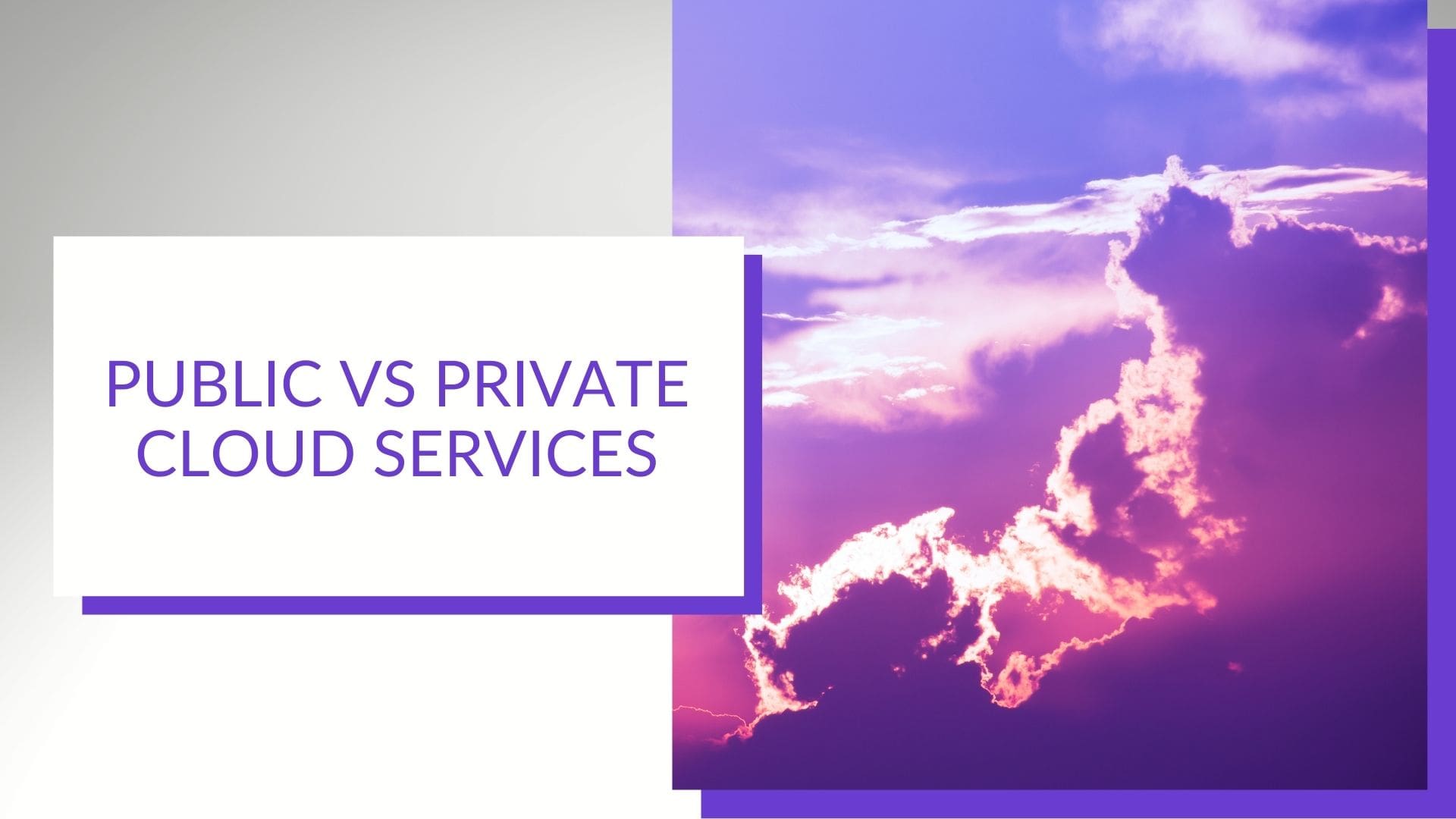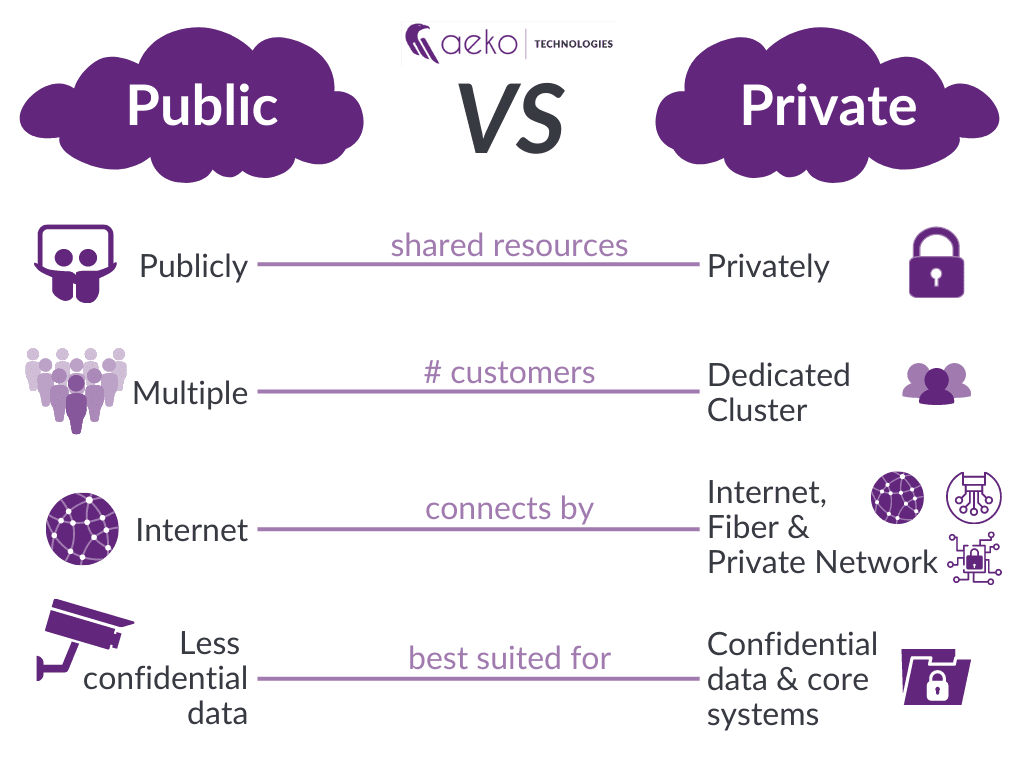
Public vs Private Cloud Services: What Is Right for Your Business?
As an IT support provider for small- and medium-size businesses, we get a lot of questions about “the cloud.” Here are the basics to consider if you’re thinking of switching to cloud services.
Sooner or later your business will probably migrate its data to a cloud service of some kind. Industry leaders believe it is the most secure way of protecting sensitive data. Not only that, but if your information or data is on a cloud, rather than on your office server, it can be accessed by your users from anywhere in the world.
That easy access has become critical in these days of COVID-19 work-from-home situations. Many businesses are realizing just how much cloud services can impact their business continuity. So where exactly is the cloud?
Understanding the Cloud
The term the cloud conjures up a vision of an ethereal place on the internet where data floats around without the need for computers. In reality, data on the cloud is being shared across multiple servers and data centers. This allows you to store files, access applications and run servers and desktops from anywhere — all without your IT staff having to worry about capacity planning or, in some cases, having to manage the server or application at all.
Cloud solutions are often confused with “hosted” data solutions. A cloud solution will be shared across multiple servers and data centers. This allows for scalability and survivability. A hosted solution is generally just storing your data on someone else’s server. There still may be value to a hosted solution, but it doesn’t provide the same benefits that a true cloud solution provides.
Cloud computing includes:
- Cloud storage
- Data management
- Access to software and applications
- Content delivery
- Service delivery
Public vs Private Cloud
There are three different types of cloud services: public, private and a hybrid of the two. Which one is right for your business will depend on your business needs and goals.
- Public: Almost everyone knows about public cloud services like Google Cloud and Apple iCloud services. Techies may also have heard of Microsoft Azure and AWS (Amazon’s cloud services). Your cell phone probably automatically updates to a public cloud service such as one of these.
If you use a public cloud, your business has reserved space on one of these platforms that is also open to many other businesses and individuals to reserve space. The public cloud is convenient and free or affordable for most people and it keeps all your data data in one place that is accessible from anywhere (and any device) with an internet connection. It is not, however, as secure as the private cloud.
- Private: As the word implies, this is a private space on the internet, not shared with any other company. It can be hosted on site or by a third party data center. It is the most secure type of cloud services and is also streamlined to your company’s needs. It protects both your sensitive and non-sensitive data.
- Hybrid: Lastly, there is the hybrid method of mixing private and public. It is considered the best of both worlds as it allows easier and more cost-effective storage on the public cloud for less sensitive data while keeping sensitive data and core systems secure in a private cloud.

Benefits of Cloud Computing for Your Business
If you’re still on the fence about a move to the cloud, here are some clear ways cloud services can provide strategic value to your business:
- Accessibility. Work from anywhere is enabled with the cloud. Employees, clients and investors can access the data you give them permission to whenever they want and wherever they may be.
- Efficiency. Accessing data on the cloud is typically fast and doesn’t get bogged down when multiple people are on the system.
- Security. A well-designed cloud infrastructure not only protects data securely, but usually off-site, making your business less vulnerable to changes to your office access (e.g., due to quaratines or storms). Plus it isn’t dependent on a single server, so hardware problems have less impact.
- Scalability. You can scale your cloud services quickly to meet your needs rather than having to plan potentially years in advance. Plus there is no need to revamp outdated technology. You’ll always have the latest software and technology.
The silver lining of cloud services is that when companies move their systems and data to the cloud they experience less downtime and loss of productivity.
Aeko Technologies can help you decide which is the best choice for your business and help you migrate your data to your chosen cloud solution. Book a no-obligation consultation or contact us for more information.
Are you aware of the most common cyberattack methods?
Did you know there are over 3.4 billion phishing emails sent every day? Phishing and other cybercriminal behavior are a lot more common than you’d think.
Our free “Phishing, Smishing, Vishing, Pharming? A Cyberattacks Guide” will inform you about cyberattack methods and give you the latest in data security tips.

